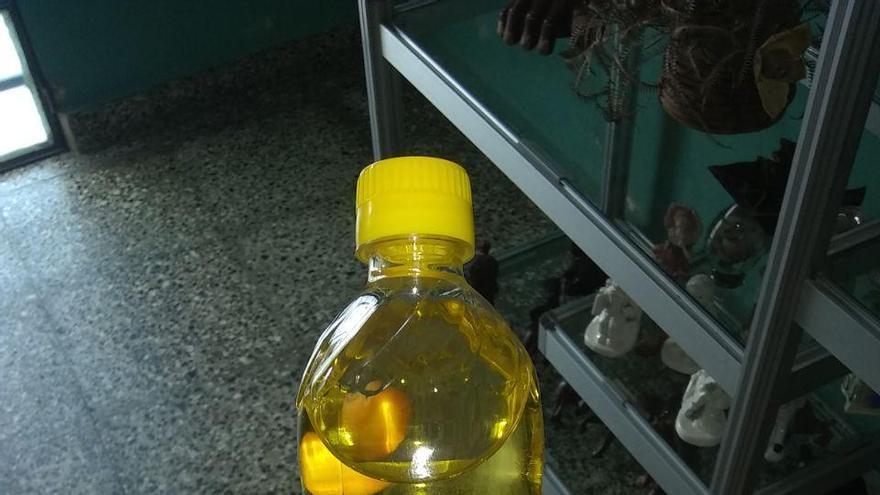
![]() 14ymedio, Havana, March 11, 2022 — Among the products Cuba imported from Ukraine in 2021, fats and vegetable oils topped the list. Though not the island’s main supplier, Cuba stands to suffer the consequences of the war in Ukraine, which include food shortages. On Wednesday, deputy prime-minister and head of the Ministry of Economics and Planning, Alejandro Gil Fernandez, warned of looming price hikes which, he said, the government plans to fight with “socialist solutions.”
14ymedio, Havana, March 11, 2022 — Among the products Cuba imported from Ukraine in 2021, fats and vegetable oils topped the list. Though not the island’s main supplier, Cuba stands to suffer the consequences of the war in Ukraine, which include food shortages. On Wednesday, deputy prime-minister and head of the Ministry of Economics and Planning, Alejandro Gil Fernandez, warned of looming price hikes which, he said, the government plans to fight with “socialist solutions.”
Gil Fernandez noted that markets are already reeling from the price of fuel, which has affected all modes of transportation, particularly charter boats. He pointed to skyrocketing prices for oil, wheat and soy flour, a situation that is raising inflation rates around the world. This threatens to be catastrophic in Cuba, however, because — though he did not mention it — currency unification has already had its own inflationary impact, with prices having risen as much as 70%.
Governments around the world are preparing contingency plans to deal with the effects of increasing supply shortages and inflation resulting from what the the United Nation’s own Food and and Agricultural Organization described on Friday as “disruptions in logistics and supply chains of grain and oilseed in Ukraine and the Russian Federation, as well as restrictions on Russian exports,” which have significant implications for food security around the world.
Gil Fernandez did not specify, however, what ideas the Cuban government has for dealing with the situation beyond its stated intention of focusing on “fair administrative and socialist solutions” with the goal of protecting vulnerable citizens through price controls rather than providing subsidies to state-owned businesses.
He also noted that 500 Cuban companies have reported losses for 2021 though he pointed out that, for many of them, the problem was one of inefficiency but that prices for their goods and services were not enough to cover costs of raw materials and manufacturing. In any case, he admitted that the government was in no condition to bail out money-losing enterprises, especially those which are overstaffed or which distribute profits.
Though Gil Fernandez stated in his speech on Thursday that the current tense international situation must be “faced with a clear head,” Finances and Prices Minister Meisi Bolaños took the opportunity to talk about the national budget, explaining that adjustments are being made to deal with loss of foreign exchange earnings due the pandemic and “the worsening American blockade,” which have forced the government to spend 17 billion pesos to cover expenses.
In addition to the problems stemming from the pandemic-related fall in tourism and an expected decline in tourists from Russia, there is the issue of food.
For Cuban families the news is bleak. For months, vegetable oil has been in short supply on the island, where fried, salty foods and other items using large amounts of oil are a mainstay of the cuisine. As culinary options decline, Cuban cooks are increasingly turning to dishes such as croquettes, which can used to stretch the limited amount of animal protein available.
Cookies, breads, pizzas and pastas also play an important role in daily meals. Many Cuban households follow the tradition inherited from their Spanish ancestors of augmenting lunch or dinner with a slice of bread. It also provides an essential guarantee that children are able to have an an afternoon snack at school. And at private cafes it practically serves as the main course.
Bread with cheese, bread with ham, bread with mayonaise and — for the poorest — bread with a spoonful of sugar often constitute some people’s main meal. Home-delivery menus and those of many privately owned restaurants also feature items made from wheat flour, so any reduction in supply would have a severe impact on the food service sector.
It could even impact the critical distribution of rationed bread, a frequent target of complaints over its declining quality and size. Individuals are entitled to 80 grams of bread a day, though they rarely receive that much. An attempt to replace wheat flour with cassava or sweet potato flour has not gone over well wiwth consumers, who describe the substitutes as hard and tasteless.
____________
COLLABORATE WITH OUR WORK: The 14ymedio team is committed to practicing serious journalism that reflects Cuba’s reality in all its depth. Thank you for joining us on this long journey. We invite you to continue supporting us by becoming a member of 14ymedio now. Together we can continue transforming journalism in Cuba.
